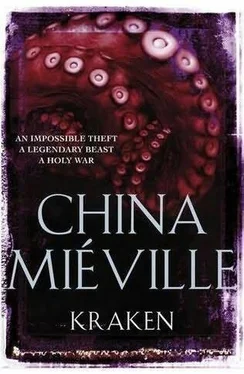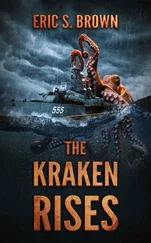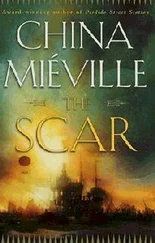In the case of the alarm system she had installed in Billy’s doorway, for example, she had primed it specifically for ingress. That it might trip, even faintly, in the case of egress, was a product not of design but of Collingswood’s powerful but slapdash methods.
That would have bothered a perfectionist. But then that perfectionist would not have been alerted when intruders removed Billy from the flat that they had never broken into, as Collingswood, lurching awake and for several moments confused, her heart gonging and an aching in her ears, was.
THEY WERE IN A BEAT-UP CAR. THE MAN GOSS DROVE. IN THE back, the boy, Subby, held Billy’s arm.
Subby had no weapon and did not grip hard, but Billy did not move. He was frozen by the man and boy having unfolded in his room-the intrusion, the drugged dragging of the world. Billy’s thoughts stuttered in loops. He felt dragged across time. A smear of pigeons was behind the car, pigeons that seemed to have been following him for days. What the hell what the hell, he thought, and Leon.
The car smelt of food and dust and sometimes of smoke. Goss had a face wrong for the time. He looked stolen from some fifties. There was a postwar cruelty to him.
Twice Billy’s hand twitched and he imagined a quick bundle and rush, throwing open the door and rolling into the street, away from these arcane kidnappers. Begging help from the shoppers in that Turkish grocer and the Wimpy hamburger place, running through, where were they, Balham? Each time the thought came Goss made a tch-tch noise and Subby’s hand would squeeze, and Billy would sit still.
He had no cigarette, but every few breaths Goss would exhale sweet woody smoke that would fill the car and go again. “What a ruddy night for it, eh?” he said. “Eh, Subby? What’s that pootling about? Someone’s out for a walk what oughtn’t was, don’t you coco? Someone’s woke up, Subby.” He wound down the window, an old hand-crank handle, looked up at the sky, wound it up again.
They hauled through streets of which Billy had lost all sense. They must be out in zone three or four where shops were keycutters and independent stationers. They passed no major chains. No west-coast coffee, not a Tescos. How could these be streets? Garages, timber-yards, judo gyms, cold pavements where rubbish moved quietly. The sky closed its last crack and it was night. Billy and his abductors were following rails, shadowing a lit-up train. It ushered them somewhere. They stopped by a dark arch.
“Chop chop,” said Goss. He looked up suspiciously and sniffed. He pulled Billy from the car. Billy thought he might puke. He reeled. Goss exhaled one of his smoky exhalations. He unlocked a door in corrugated iron and pushed Billy through into the black. Subby tugged from somewhere.
Goss spoke, as if Billy and he were in dialogue: “Is he then?” “Don’t know, might be, you got everything?” “Alright now, get the door, ready?”
Something opened. There was a change in the air on Billy’s face. Goss whispered, “Hush now.”
The room they were in smelt of damp and sweat. Something shifted. There was sound, a sputtering and crack. Lights came up.
There were no windows. The floor was dirty cement. The bricks sloped overhead were mapped with mildew. The chamber was huge. Goss stood by the wall holding a lever he had thrown. The room was full of lights, dangling on wires and jutting mushrooms from wall cracks.
Goss swore mildly as if at curious pigs. Billy heard a radio. A circle of people waited. Figures in leather jackets, dark jeans, boots, gloves. Some in band T-shirts, all in motorbike helmets. They held pistols, knives, cartoonishly vile nail-studded clubs. A radio played staticky classical music, fuzzed. There was a naked man on all fours. His lips fluttered. He had dials pushed into him, above each nipple. Unbleeding but extruding clearly from his body. It was from his open mouth that the radio sounds came. His lips moved to make the music, interference, the ghosts of other stations.
On a brick dais was a man. An older scrawny punk with spiked-up hair. A bandanna hid his mouth. His eyes were so wide he looked unhinged. He breathed hard, the cloth of his mask gusting in and out, and he was sweating in the cold. He was topless. He sat on a stool, his hands in his lap.
Billy was dizzy and sick from everything that night. Billy tried not to believe what he was seeing. Tried to imagine he might wake.
“Billy bloody Harrow,” the man said. “Check what that little bitch is doing.”
One of the figures in helmets twisted a dial on the radio-man’s chest, and radio-man’s mouth changed to sudden new shapes as the song ended. He whispered in little bursts and spoke barely audible interactions, men’s voices and women’s.
“Roger that ic-two, Sarge,” he said, and, “Have a word with Vardy, will you?,” and, “ETA fifteen minutes, over.”
“Not there yet,” the bandanna man said. “They’re visiting your old house.” His voice was loud and low, London-accented. Goss shoved Billy closer. “Send that lot, then,” he said. “Are you going to make me go through various motions, Billy Harrow? Can you just tell me who it is you’re with and what it is you’re doing? Can you tell me puh-lease what is going on tonight, what it is you set walking. Because something’s out there. And more to the bloody point, what, pray bloody tell, is your interest?”
“WHAT IS THIS?” BILLY WHISPERED AT LAST. “WHAT DID YOU DO TO Leon?”
“Leon?”
“You know how it is,” Goss said. “You’re both vying for the best vol-au-vent, and the next thing it’s all been eaten.”
Goss held Billy as if he were a puppet. Little Subby’s hands clutched Billy’s own.
“What’s going on?” Billy said. He stared everywhere, at the radioman; he struggled. “What is this?”
The sitting man sighed. “Bugger,” he said. “You’re going to do this.” His staring eyes did not change at all. “Let me put it to you this way, Billy. What the fuck are you?”
He twisted on his stool. He raised his hands a little. He was blinking violently. “Who are you working with?” he said. “What are you?” Billy realised that the kerchief was not cowboy-style but was haphazardly balled in his mouth. The man was gagged. He shook his hands and Billy saw he wore handcuffs.
“Turn your fucking head!” the voice continued, from this man who could not be speaking. “Turn around.” One of the helmeted guards slapped him hard across his face, and he screamed muffled into his gag. “Stand this bugger up.” Two guards hauled him up by his armpits. His head lolled. “Let’s see,” the voice said. The guards turned the man to face the back wall.
Colours appeared. The whole of the topless man’s back was a tattoo. At its edges it was wisps of coloured swirl, crossbred Celtic-knot fractals. In the centre was a big, dark-outlined, stylised face. Bold and expertly done. A man’s face, in unnatural colours. A sharp old face with red eyes, something between a professor and a devil. Billy stared.
The Tattoo moved. Its heavy-lidded eyes met his. Billy stared at it and the Tattoo stared back.
BILLY SHOUTED IN SHOCK AND TRIED TO SCRABBLE BACKWARD. Goss held him.
The guards held the punk-haired man still. The Tattoo’s inked eyes went side to side, like an animation, as if it were a cartoon projected onto him. The thick black edges travelled, the shaded blue, blue-green, copper sections of skin shifting as the Tattoo pursed its lips, watched Billy, raised its eyebrows at him. It opened its mouth, and a hole of dark ink opened, a drawn throat. It spoke in that deep London voice.
“Where’s the kraken, Harrow? What’s your angle? What does Baron’s gang want with you?” The radio-man whispered static.
Читать дальше











